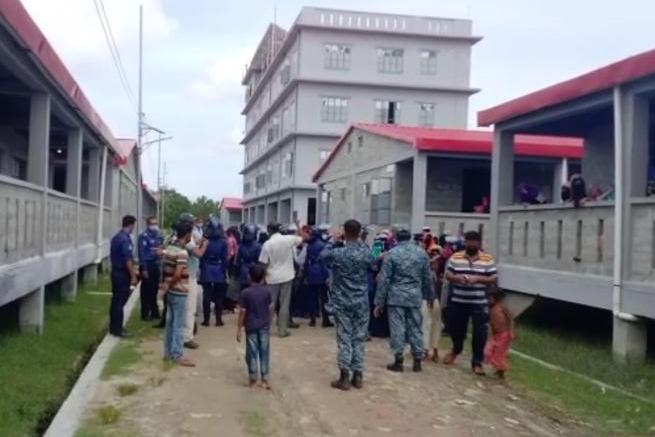Defying opposition from the United Nations aid agencies, international humanitarian organizations and non-governmental organizations, Bangladesh moved more than 1,642 Rohingya Muslim refugees to Bhasan Char. This is a small island, that has emerged in Bay of Bengal 20 years back, about 34 miles off the coast of Bangladesh.
The people transferred now are only a tiny portion of an estimated one million Rohingya currently living in refugee settlements around Cox’s Bazar area close to Bangladeshi borders with Myanmar. Of these, about 730,000 arrived in August — September of 2017 following the Myanmar military crackdown that forced them to flee for their lives.
The UN says the action was undertaken with a genocidal intent. Myanmar denies these claims and argues that its forces were targeting rebels who attacked police posts close to the border.
Questioning the suitability of living conditions on the island, the UNHCR will only engage with the Bangladesh government on the relocation project after they are allowed to conduct an assessment on the suitability of Bhasan Char. The UN also continues to emphasize that anyone who relocates there should do so “of their own free will.”
Rights groups have accused authorities of coercing the refugees to move. The Bangladesh foreign minister, denying any coercion disclosed that a decision to relocate a 100,000 Rohingyas to Bhasan Char has already been taken by the government.
Many experts feel that resettlement of Rohingya in Bhasan Char leaves them vulnerable to extreme climatic events, more isolated that could spark a whole new crisis.
The island relocation plan and the backlash it has created testify to multiple obstacles facing a lasting solution to the humanitarian crises created by the massive flight of the Rohingyas, facing ethnic cleansing in Myanmar.
The Bangladesh government, having spent $300 million preparing the island for human habitation, argues that relocation is needed because the existing camps in Cox’s Bazar have become overcrowded and thus harder to manage due to socioeconomic and security challenges.
There have been reports on drug trafficking and small crimes in the camps. Some reports suggest shoot-outs, kidnappings and killings in the Cox’s Bazar area where the Rohingya camps are located. But moving them to Bhasan Char is no guarantee that criminal gangs among refugees will not emerge there. So, moving them to the middle of the sea may not be the answer.
Bangladesh under financial strain
Costing nearly $900 million annually to maintain these refugees, Bangladesh is under financial strain. Though international support is available, much of the cost is borne by the government itself. The administration also faces a waning goodwill for the Rohingya within the Bangladeshi community, which makes it harder for the government to allocate more funds.
Tom Andrews, the UN special rapporteur on the situation of human rights in Myanmar is clear that it is Myanmar that has the legal and moral responsibility for ending this crisis. After being forced to run for their lives, the Rohingya deserve to return home in safety, he adds.
But because of the lingering fear for their lives, denial of citizenship and freedom of movement, the Rohingya refugees refuse to return home. Myanmar however, continues to deny committing genocide, justifying the 2017 operations to root out insurgents only.
Myanmar has not done anything to eliminate the root cause of discrimination against the Rohingya. The lives of about 600,000 who remain inside Myanmar, stripped of their basic civic rights and citizenship, living in camps is no comfort for the refuges to go back.
Ethnic cleansing
Rohingya Muslims are being targeted and compelled to flee and seek refuge elsewhere under a phased plan beginning in 1978, when the first mass exodus took place.
Other phases of ethnic cleansing have occurred in early 1990s followed by one in 2015. But the last one of August- September 2017 was the most devastating of all. With no future for the rest in Myanmar, they will also be pushed out once the international outcry has subsided over the last expulsions of 2017.
Facing Myanmar’s obstinance and the Rohingya’s fears of returning to risking their lives again, no one is focusing on the repatriation of the Rohingya back to Myanmar. The military-led government is not going to change. There is therefore, no hope that these destitute Rohingya will be allowed to return home under ordinary circumstances.
There are only two choices — either they are accommodated among various other countries or the international community enforces a Kosovo or Bosnia-like solution where the Rohingya can return home in safety and honor.
*The writer served as an adjunct professor at the Lee Kuan Yew School of Public Policy, National University of Singapore. He was a member of Pakistan’s Foreign Service from 1973 to 2008 and was Pakistan’s consul general to Dubai during the mid 1990s.
January 4, 2021
The viewpoints expressed by the authors do not necessarily reflect the opinions, viewpoints and editorial policies of Aequitas Review.


